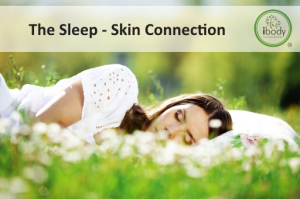We aren’t the first ones to tell you to get plenty of sleep. It’s a critical habit for being healthy as can be – and yes, it affects your skin, too! The concept of “beauty sleep” is very real! You’ve probably skimped on sleep at some time in your life – do you remember how you looked the next morning? 
Most of us experience bags under the eyes, skin that sags a bit more, and an overall “lackluster” look when we don’t get enough sleep. Over time, with a chronic lack of sleep, skin issues only get worse.
New York City dermatologist Doris Day, MD, explains:
Your skin, and your whole body, goes into repair mode when you sleep.
Without rest, your body – including your skin – don’t get that chance to repair.
Not getting enough sleep? There’s good news: “The good thing about the skin is that it recovers quickly.” Day confirms.
How Much Sleep For Healthy Skin?
The average person needs 7-9 hours of sleep. Teens and young adults tend to need a bit more sleep than older adults.
A good rule of thumb is that you should be able to get out of bed in the morning feeling refreshed – not dragging. Feeling groggy for more than a few minutes when you wake up indicates that you are not getting the shut-eye you really need.
More isn’t necessarily better, either: oversleeping is just as detrimental to your skin (and health in general) as not getting enough rest.
How to Get A Great Night’s Sleep
Here are a few ideas to help you naturally fall asleep more easily. Getting quality rest each night will help you feel more energized and focused all day long – and look great doing it!
- Set a routine. Having a routine in place will, after a while, get your body into a rhythm of falling asleep and waking up at a certain time. Try to repeat the same set of activities before you head to bed each night – you’ll condition your mind to get your body into “sleep mode.”
- Use aromatherapy. Certain essential oils are calming and promote restfulness and sleep. Lavender, for example, has wonderful soothing qualities. Buy it in the natural oil form and use a few drops in a warm bath. This will help your body relax. You can also drop a few drops of lavender onto your pillow to help you fall asleep.
- Unplug. “Mind chatter” is a common complaint among those who find it hard to get to sleep at night. It’s no wonder – in our high-information, fast-paced culture, quieting the mind can be nearly impossible. Take steps to reduce this effect by spending time “unplugged” from technology each day.
- Destress. Stress can lead to insomnia due to more of the “mind chatter” as well as the physical manifestations of anxiety. While we all face stressful challenges from time to time, it’s possible to minimize many of the things that cause chronic stress in our lives. Identify parts of your life which cause the most stress and make a plan to proactively deal with the situation and cultivate a positive mindset. Wise woman Maya Angelou said, “If you don’t like something, change it. If you can’t change it,change your attitude.” Her advice is useful to everyone at some point!
Do you think you get enough sleep?
